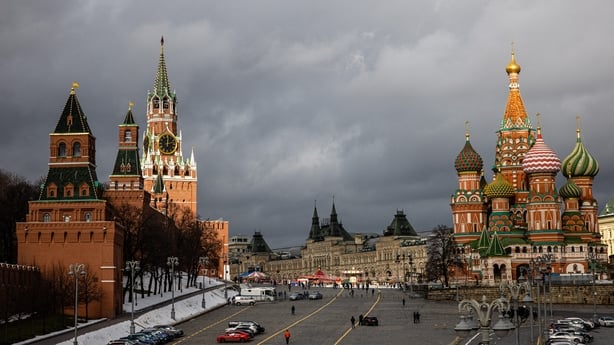Irish people living in Russia are considering leaving because of uncertainty and rising tension stemming from sanctions and the invasion of Ukraine.
This comes as Ireland warned its citizens against travelling to the Russian Federation and advised those planning to leave the country "to do so as quickly as possible".
The Department of Foreign Affairs said it is "recommending against travel to the Russian Federation until further notice, owing to the rapidly deteriorating flight and transport options in and out of the country.
"Irish citizens currently in Russia on a temporary basis, and who wish to leave or have plans to leave in the coming weeks, are advised to do so as quickly as possible."
Members of the expatriate community in Russia are weighing up their options on whether to leave the country, including Irish people, according to Dubliner Hugh McEnaney, who has lived in Russia since 2007.
Speaking on RTÉ's Morning Ireland, he said: "I see a lot of people concerned. I have had families from South Africa, Australia, Ireland and the UK in the last two days contacting me and saying: 'We are leaving'."
Dave Pearce, who has lived in Russia for over two decades, said Irish people are worried.
"Certainly with the crisis starting and the activity in Ukraine. The majority would be having second thoughts.
"Even someone like myself who has been here 22 years … my wife who is Russian but was brought up in the Ukraine … you know, we have to look at the alternatives," he said.
Mr McEnaney said he will remain in Russia because it is not easy to relocate.
"Me going back to Ireland? I have been here 14 years, my life is here," he said.
"What would I do if I went back to Ireland? I would have to find money to either buy a home or rent a home - which is a huge expense.
"Luckily I can work remotely but the fact that I am paid in ruble, my salary has already dropped … because of the drop in the ruble. There are a lot of factors. You can't just push a button and leave. You have to be practical about what your next steps are," he added.

Alan Moore, director of the International Affairs Office of the National University of Science and Technology MISiS in Moscow, said it is not easy to leave the country because of the cancellation of international flights.
"My mum and my relatives at home, they're worried but if nuclear war kicks off nowhere is safe. At the moment, unless I just get on a donkey and head up towards Finland there are very little ways to get out," said Mr Moore, who has lived in Russia since 2008.
"From the Russian people that I work with, that I am in contact with from many walks of life, everyone is hoping that this will end," he said.
Irish people living in Russia, who spoke to Morning Ireland, also confirmed there is support for the invasion of Ukraine.
They added sanctions are also being felt by ordinary people through banking difficulties, rising prices and the value of ruble.
Mr McEnaney's wife is Russian.
"I met my in-laws last week and the support for Putin’s actions is very strong from the older community - that’s anyone from about the age of 50 onwards who had some experience of what it was like living here in the Soviet Union. They feel that Putin’s actions are justified," he said.
"The younger generation. People in their early 20s and 30s, they feel that they’ve been screwed around by Putin from an economic standpoint," he added.
Mr Pearce agreed with Mr McEnaney’s opinion that there is mixed opinion on the Russian invasion of Ukraine.
"Many Russians are totally against what is happening at the moment. They feel that the Ukrainians are part of them and there should not be a conflict between the two nations. Some of the people who might be pro what is going on, these generally are people of an older age," he said.
"Younger people are generally anti what is going on at the moment.
"The immediate sanctions have taken effect, certainly within the financial sphere. Many people have been on to me saying they are restricted in transactions, they couldn't withdraw money - things like this.
"The ex-pats here - not only Irish - have said they think it is the end of their business associations in Russia.
"Salaries have dropped technically 30% because foodstuffs are going to be astronomical. In a way it's, I think, a disaster for Russian people.
"I have noticed myself in two days the cost of things have gone up. Some basic foodstuffs. For example, some types of bread - like bun bread - is gone up 20 or 30%," Mr Pearce said.







